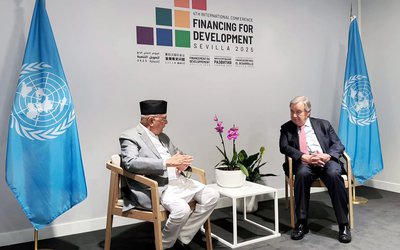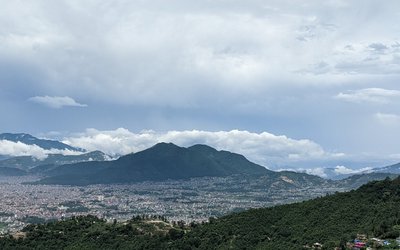
Despite the Nepalese government's claims of creating a favorable environment for foreign investment by amending laws and regulations, FDI is actually decreasing in Nepal, according to the excerpts. So, what factors contribute to this trend?
The government has indeed taken steps to establish a legal framework for Foreign Direct Investment (FDI) in Nepal. However, the implementation of FDI laws in Nepal presents significant obstacles to attracting foreign investment. One key issue is the absence of comprehensive project financing law, which I have been advocating for in various forums for several years. While this concern has garnered some public attention lately, however, concrete measures have yet to be put in place.
Why do Nepal needs Project Financing?
Project financing legislation focuses on financing aspects, including investment for projects that require substantial capital, not only equityinvestment, it also requires substantial amount in the form of debt investment. Let’s say a mega project requires investment of one-billion-dollar, in this context the modalities of the investments would be 30% equity investment and 70% debt investment. Without understanding equity-debt ration portion, foreing investment in mega project is not possible. Even though government and banks often prioritize their own goals in term of investment and lending, they must take into account the issue of project financing laws which should cover all standard financing areas related to infrastructure projects that demand such significant investments.
How do you see FITTA?
Regarding FITTA, it stands for the "Foreign Investment and Technology Transfer Act." Under Nepalese law, FITTA stipulates that only an investor's equity participation is recognized and priority is given as foreign investment, while loan and debt investments from foreign banks are not considered as such.In the context of investments in industries and infrastructure, two main aspects are considered: equity and debt investments ratio. In infrastructure development projects, typically, developers invest only 20 to 30 percent of their own funds as equity and secure the remaining financing from banks and financial institutions as debt. For instance, if a $1 billion project is being constructed in Nepal, only 20 percent of the investment would consist of cash as equity investment, while the remaining 80 percent would come from loans provided by international banking agencies and financial institutions as debt investment. However, under FITTA, only the equity participation is recognized as foreign investment.The exclusive recognition of equity as foreign investment in Nepal appears to deter potential investors making debt lending in mega project in Nepal.
What do you suggest then?
There's a need for legal reforms to provide equal levels of protection and recognition of debt and loan investments as foreign investment under the FITTA. . This would offer more security and flexibility to investors and financial institutionsand developer of the Project. It's also important for the legal framework to prioritize safety and security in investment proceedings to attract and retain foreign investors. This includes ensuring that in case of loan defaults from developer, theforeign banks have the authority and power totake over the project and its assets, then assign the projectassets and its shares to third party based on their judgment to protect their investments.However, it's important to recognize that the rights of lenders and bankers are often overshadowed in the current legal landscape.However, existing legal frameworks primarily concentrate on safeguarding investors' equity while offering minimal protections concerning the debt and loans established by global financial institutions and banks. In situations where lenders fail to repay the borrowed amounts, their recourse options are notably limited and burdensome which inhibit foreign lender from making loan investment in Nepal
How do you see the repatriation issue?
Repatriation of investments and profits poses a significant challenge for foreign investors in Nepal. If a foreign investor, including banks, wishes to repatriate their investments and earnings, they encounter stringent legal constraints. For instance, if a lender provides a substantial billion-dollar investment to a promoter and subsequently seeks to repatriate it, they must collaborate with a local bank as their representative/agent and secure assets, thereby exposing themselves to potential risks. It's worth noting that while the promotion of investments is encouraged, the laws of Nepal need to places more emphasis on financial contributions than on the qualifications of individuals occupying top positions. In the event that the designated agent fails to perform their duties efficiently, there may be repercussions and arise serious risk on the debt investment. Furthermore, Nepal's labor laws impose strict limitations on the recruitment of foreign employees by investors, contrasting with the more lenient regulations found in the United States and European countries. Consequently, foreign investors interested in conducting business in Nepal encounter notable restrictions.
Do you think Nepal is favorable place for FDI?
Nonetheless, Nepal should not be dismissed as an unfavorable destination for Foreign Direct Investment (FDI). On the contrary, its untapped potential positions it as a prime location for FDI. Nevertheless, Nepal's legal framework does present challenges for investors, which may serve as a deterrent to further investment. The country boasts a promising environment for conservation and sustainability, but realizing this potential necessitates the creation of a supportive environment. This can be achieved by implementing effective laws and policies, establishing a competent and impartial judiciary, and promoting transparency.
How do you envision Nepal's future in business and investment competition, especially as it prepares to graduate from its status as a Least Developed Country by 2026?
Nepal's upcoming graduation from Least Developed Country (LDC) status indeed marks a significant milestone, reflecting substantial progress across various economic and social dimensions. However, it's important to recognize that despite this achievement, Nepal's overall situation is unlikely to undergo a significant transformation immediately after graduation. To use an analogy, it's as if we are currently navigating a challenging and dilapidated road, putting our economic vehicle at risk of crashing. Therefore, in addition to graduating from the LDC category, Nepal must establish a more robust and sustainable economic framework so that the vehicle of growth move smoothly.
What specific changes or actions would you recommend for Nepal to pursue post-graduation?
There are several crucial areas that Nepal should focus on post-graduation. First and foremost, we must enhance the flexibility and effectiveness of our legal system. This means increasing judicial predictability and competitiveness while ensuring that governance is more accountable. Substantial amendments to financial laws and institutions are indispensable. A stable government, a strong economy, reliable laws and policies, a competent judiciary, and an efficient arbitration process or dispute settlement mechanism are all essential components for attracting and retaining FDI. We must also prioritize the control of corruption, enhance transparency, and bolster accountability to mitigate potential risks.
What do Nepal get benefit from graduation?
One of the important aspects is obtaining international financial ratings. Currently, Nepal is categorized as a high-risk nation, leading to high borrowing rates as it does not position of financial rating in international financial market. Graduation is expected to improve our rating status, making borrowing less expensive and enticing for international corporations. Without these ratings, major corporations are often hesitant to invest in Nepal. If foreign lending agencies are hesitant to make investment in Nepal, the cost of doing international trade and business will be costly and less competitive in international market. Therefore, obtaining a rating is imperative for Nepal's future competitiveness.
How do you see the role of foreign investment in Nepal's economic growth and development?
FDI plays a vital role in Nepal's economic growth and development and without FDI, the growth of infrastructure project is not possible. In recent years, we have witnessed FDI inflows in various sectors, including consumer goods, hydropower, and finance, tourism, and cement production. These investments have the potential to stimulate economic activity, create jobs, and contribute to the overall development of the country. However, it's essential that Nepal continues to create an environment conducive to foreign investment, ensuring legal predictability, a stable government, and accountability. Global courts prioritize foreign investment, and the decisions made in international cases can significantly impact a country's image and competitiveness. Thus, attracting and retaining FDI is crucial for Nepal's future economic success.
In your experience with international courts, how do you compare Nepal's courts?
Nepal's courts have shown a commendable level of dedication to handling FDI cases. While the judges in Nepal do not seems to possess the same level of competence as their counterparts worldwide, there is a need for orientation training to judges handing such FDI case as well procedural improvements in the court to ensure high-quality decision-making in FDI cases. Resolution of the cases in Nepali court is taking more time than expected. The Court rules and procedure in handling the cases should be improved so that trust of investor in Nepali judiciary must be enhanced so as to give them trust that the dispute related to investment is decided on time.
In what areas does Nepal require FDI?
Foreign capital is crucial for the development of various sectors in Nepal. This includes industries, hydroelectric power capabilities, airport infrastructure, and luxury accommodations( Tourism). The primary goal is to boost exports and reduce imports. Nepal is well aware of its weak export market, which has led to a substantial trade deficit due to excessive imports, putting pressure on foreign currency reserves. To enhance product quality, competitiveness, and production capacity, substantial investments in the country's manufacturing sector are imperative.Taking immediate action in this sectorsare not only essential to safeguard foreign currency reserves but also to address the trade deficit by increasing exports and decreasing imports. Given Nepal's limited financial resources, obtaining FDI, whether as grants or loans, is a critical step in achieving these objectives.
Is Nepal's Industrial Environment Conducive?
Nepal's industrial environment is not conducive to high-quality manufacturing, and it faces several existing challenges. This situation can be attributed to a variety of factors, including labor concerns, tax issues, insufficient infrastructure, unreliable electricity supply, market fluctuations, and unstable government fiscal policies. Furthermore, the scarcity of resources needed for industries is discouraging potential investors from considering Nepal as forum for investment. Lack of resources make our industrial product more expensive with comapare to the industrial production in India and China Additionally, due to high production costs, Nepali products face a competitive disadvantage in the global market.
What are the obstacles to achieving success in Foreign Direct Investment (FDI)?
As I have already mentioned you, two major obstacles hinder the success of Foreign Direct Investment (FDI) in Nepal. Firstly, there is a legal barrier due to inadequately detailed laws that fail to establish a level playing field for investors. The second obstacle is the poor implementation of laws and regulations, resulting in infrequent and proper enforcement of well-intentioned laws. Bureaucratic hurdles are also excessively burdensome. The government's stance on welcoming foreign investment, both in words and actions, needs improvement. While Nepal aims to attract FDI, there is still ample room for enhancement. It is crucial to address these issues and make the investment process more accommodating to foreign investors. When foreign investors engage with the Nepalese system, they often encounter resistance both from the bureaucracy and the public. They face initial challenges in finding local partners and bringing in experts, technology, and capital. Despite the government's pledge to follow a one-window approach, the decision-making process for potential investors is hindered by multiple stages.
What is the concept of "one door" in your policy?
The concept of "one door" in our policy refers to the single point of entry. However, once inside, you will find numerous exit options to choose from. This can be somewhat puzzling for individuals. Therefore, the revised version will be: Upon entering, you will find numerous exit options to choose from. This is the reality. One door policy means once an investor is in, his concern or issues needs to addressed and decided by one office or department without running to different government agencies. Currently, one door policy is not working properly
Why do corruption, lack of transparency, unstable governments, and unaccountability persist?
The persistence of corruption, lack of transparency, unstable governments, and unaccountability can be attributed to several factors. Notably, officials, whether in senior or junior positions, often hesitate to take accountability for these issues. Despite recent efforts, such as the prime minister's call for increased accountability and transparency among government employees, bringing about substantial change remains challenging. Complicating matters further, our laws contain numerous indeterminate clauses that do not specify who is accountable for decision-making. Consequently, employees tend to avoid making decisions that entail any degree of risk.
How do foreign investors decide on their investments?
Foreign investors carefully evaluate various factors when deciding on making their investments. These include scrutinizing a country's court system, labor laws, and tax requirements and policy stability. They assess the performance of the judiciary, paying close attention to the predictability and competence of judges. Additionally, they consider hiring and firing procedures, tax structures, and regulations related to foreign currency, including repatriation issues. Foreign investors have expressed concerns about public litigation petitions, as they can disrupt investment process. . In contrast to other countries where fast-track systems expedite the resolution of foreign direct investment disputes, the process in Nepal can be time-consuming, taking months or even years. Consequently, implementing a consistent system for resolving these issues is crucial.
What is your perspective on this matter?
My perspective on this matter is that the challenges related to foreign investment in Nepal stem from various sources, some of which are intentional, while others are not. Regrettably, these challenges have a detrimental impact on Nepal's reputation. It's important to recognize that Nepal is not the only country seeking foreign investment; many other nations have similar interests and they are striving for that We need to understand this reality. This doesn't necessarily mean that Nepal is an unfavorable investment destination, but it does highlight the importance of addressing the existing challenges. Foreign investors have a multitude of investment opportunities globally, and they typically seek countries that offer secure investments with high returns.
How do you view Nepal's Labor Law?

Nepal's Labor Law presents a potential challenge for prospective investors, given the inflexibility of the labor market and relatively high labor costs. At the same time, labor rule relating to “ hire and fire” of employee is very conservative which gives negative impression to foreign investor. Similarly, foreign investor who bring billions of dollar in our country is not permitted bring their own employee without any hurdle to handle such huge fund. Because foreign investor is requires going for rigorous process in hiring them in Nepal. It looks like “penny wise, pound foolish approach. In the name of regulating foreign worker force, we are creating bigger hurdle in bring necessary works force for foreign investor. We must be very sensible in address labor law issue.
How do you see the implementation of MCC now?
I firmly support the ratification of the MCC after conducting a thorough review of Compact agreement, its provisions and comparing them with similar agreements that Nepal has entered into with other multilateral and bilateral entities. My assessment of the agreement, taking into account its language and intent, leads me to confidently assert that it was signed based on the principle of sovereign equality and received ratification from both the US Senate and Nepal's Parliament. The $500 million grant offered by this agreement represents a substantial benefit and presents an exclusive opportunity for Nepal's development. The agreement is currently in its implementation stage, albeit encountering some challenges. It is Nepal's responsibility to diligently fulfill and complete the agreement within the designated period of five years by collaborating closely with various government agencies, with MCA-Nepal taking a pivotal role. It's worth noting that this project has been approved by the parliament, making it a top national priority.However, it's important to address the concerns of those in the population who still oppose the MCC. We must be very careful in implementing and completing this project on time so that it will set an example for future project as Nepal has always been failed to complete any projects it handled on time.
Why some groups are still opposing then?
In my perspective, individuals who criticize the MCC and advocate against it may not have thoroughly examined the agreement. Those who oppose MCC must know that this is grant money in which Nepal does not have to pay principle amount and interest on it. Its grant money of such huge number. In fact we must now go for with other doner country seeking grant from them instead of loan money for development. Some may oppose the project for personal gain or to protect the interests of others. The agreement outlines a grant project that aims to build a 400 kV transmission line from Trishuli to New Butwal to facilitate the evacuation of energy generated in the region. Furthermore, the agreement encompasses the construction of a segment of the east-west highway.
As the project has already started implementation, what do you suggest now?
As for whether the project will be completed on time, it's crucial to reiterate that the United States has provided a grant to support the development of critical high-voltage transmission infrastructure and an enhanced road network for technology transfer. MCA Nepal now falls under our project scope, and it's imperative that the government extends the necessary logistical support to ensure its successful implementation. This project aligns with our collective capabilities and aspirations. It is essential for all political parties to endorse the MCC's implementation to guarantee its timely completion. The announcement of the implementation of the transmission line and road project underscores that it is now Nepal's duty to offer full support. Some parties that have acted against Nepal's national interests have played a detrimental role in opposing the MCC. Therefore, it is vital for Nepal's government, political representatives, and citizens to remain vigilant regarding this issue. MCC Nepal is lacking in making general public aware of the benefit that MCC project is giving to the country. They must work toward creating public awareness of the project mobilizing media and public advocates/activist in favor of MCC or any other similar project that are currently running or being implemented in Nepal.
What are your thoughts on the recent decision made by the Indian government to approve a treaty allowing Nepal to export 10,000 MW of electricity to India?
This is indeed a momentous milestone for Nepal and its people, offering a plethora of advantages. Furthermore, this decision paves the way for foreign investments in the hydropower sector, significantly boosting its value as Nepal's hydropower now gains access to the Indian market. This agreement has been a longstanding goal for the country, and the prospective investments from top Indian companies in Nepal's hydropower sector are highly significant. Although Bangladesh has expressed interest in purchasing electricity from Nepal, India remains the primary market. Looking ahead, Nepal must take proactive measures to ensure the success of its hydropower sector. In order to tap this opportunity, Nepal needs to harness its economic diplomacy with India and China in equal footing. Without creating a positive diplomacy environment between India and China in relation to our opportunity to export hydroelectricity to India, it is not possible to develop mega hydro project unless such project is solely developed by Indian government owned company for its domestic consumption.
What additional reforms are required for Nepal to facilitate electricity exports?
To enable electricity exports, it's crucial for Nepal to recognize that the Nepal Electricity Authority (NEA) cannot operate in isolation. The government should initiate the unbundling of NEA into distinct entities responsible for generation, distribution, transmission and creating environment for open power trade in public sector. Simultaneously, legislative measures must be taken to facilitate the participation of private enterprises in the export of electricity to India. These reforms will be instrumental in ensuring a smooth and efficient electricity export process for Nepal.
- MELAMCHI WATER SUPPLY: No Interruption During Monsoon
- Jun 25, 2025
- KOREAN RETURNEES: Successful Integration
- Jun 25, 2025
- UPPER TRISHULI-1: Engaging With Local
- Jun 25, 2025
- IME GROUP: Twenty Five Years Of Journey
- Jun 24, 2025
- NEPAL’S AIR POLLUTION: A Growing Health Concern
- Jun 24, 2025















